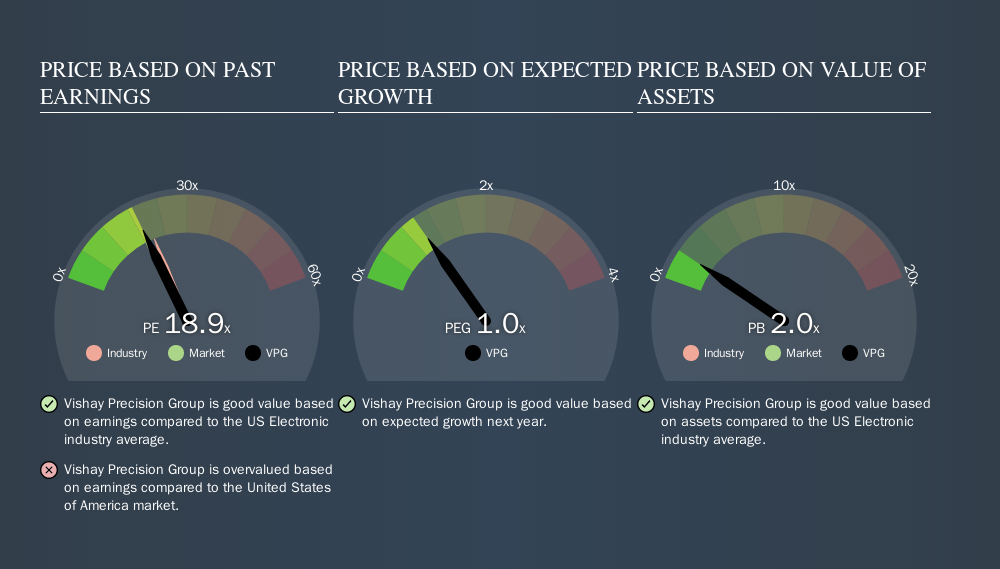Do You Know What Vishay Precision Group, Inc.'s (NYSE:VPG) P/E Ratio Means?

The goal of this article is to teach you how to use price to earnings ratios (P/E ratios). We'll show how you can use Vishay Precision Group, Inc.'s (NYSE:VPG) P/E ratio to inform your assessment of the investment opportunity. Looking at earnings over the last twelve months, Vishay Precision Group has a P/E ratio of 18.95. That is equivalent to an earnings yield of about 5.3%.
View our latest analysis for Vishay Precision Group
How Do I Calculate A Price To Earnings Ratio?
The formula for price to earnings is:
Price to Earnings Ratio = Share Price ÷ Earnings per Share (EPS)
Or for Vishay Precision Group:
P/E of 18.95 = $34.80 ÷ $1.84 (Based on the trailing twelve months to June 2019.)
Is A High Price-to-Earnings Ratio Good?
A higher P/E ratio means that investors are paying a higher price for each $1 of company earnings. That is not a good or a bad thing per se, but a high P/E does imply buyers are optimistic about the future.
How Does Vishay Precision Group's P/E Ratio Compare To Its Peers?
One good way to get a quick read on what market participants expect of a company is to look at its P/E ratio. If you look at the image below, you can see Vishay Precision Group has a lower P/E than the average (20.9) in the electronic industry classification.

Its relatively low P/E ratio indicates that Vishay Precision Group shareholders think it will struggle to do as well as other companies in its industry classification. Since the market seems unimpressed with Vishay Precision Group, it's quite possible it could surprise on the upside. You should delve deeper. I like to check if company insiders have been buying or selling.
How Growth Rates Impact P/E Ratios
Probably the most important factor in determining what P/E a company trades on is the earnings growth. If earnings are growing quickly, then the 'E' in the equation will increase faster than it would otherwise. And in that case, the P/E ratio itself will drop rather quickly. A lower P/E should indicate the stock is cheap relative to others -- and that may attract buyers.
Vishay Precision Group increased earnings per share by an impressive 15% over the last twelve months. And it has bolstered its earnings per share by 28% per year over the last five years. With that performance, you might expect an above average P/E ratio.
Remember: P/E Ratios Don't Consider The Balance Sheet
It's important to note that the P/E ratio considers the market capitalization, not the enterprise value. So it won't reflect the advantage of cash, or disadvantage of debt. Hypothetically, a company could reduce its future P/E ratio by spending its cash (or taking on debt) to achieve higher earnings.
Such spending might be good or bad, overall, but the key point here is that you need to look at debt to understand the P/E ratio in context.
Is Debt Impacting Vishay Precision Group's P/E?
Vishay Precision Group has net cash of US$74m. This is fairly high at 16% of its market capitalization. That might mean balance sheet strength is important to the business, but should also help push the P/E a bit higher than it would otherwise be.
The Bottom Line On Vishay Precision Group's P/E Ratio
Vishay Precision Group trades on a P/E ratio of 18.9, which is fairly close to the US market average of 18.1. Considering its recent growth, alongside its lack of debt, it would appear that the market isn't very excited about the future. Given analysts are expecting further growth, I am a little surprised the P/E ratio is not higher. That may be worth further research.
When the market is wrong about a stock, it gives savvy investors an opportunity. If the reality for a company is better than it expects, you can make money by buying and holding for the long term. So this free visualization of the analyst consensus on future earnings could help you make the right decision about whether to buy, sell, or hold.
You might be able to find a better buy than Vishay Precision Group. If you want a selection of possible winners, check out this free list of interesting companies that trade on a P/E below 20 (but have proven they can grow earnings).
We aim to bring you long-term focused research analysis driven by fundamental data. Note that our analysis may not factor in the latest price-sensitive company announcements or qualitative material.
If you spot an error that warrants correction, please contact the editor at editorial-team@simplywallst.com. This article by Simply Wall St is general in nature. It does not constitute a recommendation to buy or sell any stock, and does not take account of your objectives, or your financial situation. Simply Wall St has no position in the stocks mentioned. Thank you for reading.
About NYSE:VPG
Vishay Precision Group
Operates in the precision measurement and sensing technologies in the United States, Europe, Israel, Asia, and Canada.
Flawless balance sheet with moderate growth potential.
Similar Companies
Market Insights
Community Narratives




